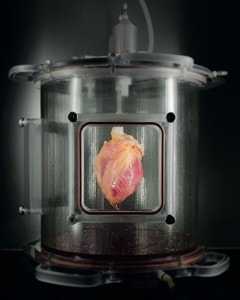
Human Myocardium on native extra cellular matrix.
Credit: The Daily Beast
More than half a million people die in the United States from heart failure each year, thousands of them while awaiting a transplant. But with the release of a new scientific paper comes a potential solution to the deficiency: growing new ones.
That’s exactly what a team of researchers at Massachusetts General Hospital’s Center for Regenerative Medicine (CRM) set out to do. Their work, published this week in the journal Circulation Research, proves the idea has the potential to be a game changer. Using skin cells reprogrammed into stem cells, the researchers were able to generate functional heart tissue.
The process would not only eliminate the need for perfect match donors, but it would dramatically reduce the chance of immunorejection. Considering that an estimated 22 people die per day awaiting an organ, the implications could be huge.










